
- Retrait gratuit dans votre magasin Club
- 7.000.000 titres dans notre catalogue
- Payer en toute sécurité
- Toujours un magasin près de chez vous
- Retrait gratuit dans votre magasin Club
- 7.000.000 titres dans notre catalogue
- Payer en toute sécurité
- Toujours un magasin près de chez vous
Description
This book is a sustained record of Hamid Dabashi's reflections over many years on the question of authority and the power to represent. Who gets to represent whom and by what authority? When initiated in the most powerful military machinery in human history, the United States of America, already deeply engaged in Afghanistan and Iraq, such militant acts of representation speak voluminously of a far more deeply rooted claim to normative and moral agency, a phenomenon that will have to be unearthed and examined.
In his groundbreaking book, Orientalism, Edward Said traced the origin of this power of representation and the normative agency that it entails to the colonial hubris that carried a militant band of mercenary merchants, military officers, Christian missionaries, and European Orientalists around the globe, which enabled them to write and represent the people they thus sought to rule. The insights of Edward Said in Orientalism went a long way in explaining conditions of domination and representation from the classical colonial period in the 18th and 19th century to the time that he wrote his landmark study in the mid 1970's. Though many of his insights still remain valid, Said's observations need to be updated and mapped out to the events that led to the post-9/11 syndrome.
Dabashi's book is not as much a critique of colonial representation as it is of the manners and modes of fighting back and resisting it. This is not to question the significance of Orientalism and its principal concern with the colonial acts of representation, but to provide a different angle on Said's entire oeuvre, an angle that argues for the primacy of the question of postcolonial agency. In Dabashi's tireless attempt to reach for a mode of knowledge production at once beyond the legitimate questions raised about the sovereign subject and yet politically poignant and powerful, postcolonial agency is central. Dabashi's contention is that the figure of an exilic intellectual is ultimately the paramount site for the cultivation of normative and moral agency with a sense of worldly presence. For Dabashi the figure of the exilic intellectual is paramount to produce counter-knowledge production in a time of terror.
Spécifications
Parties prenantes
- Auteur(s) :
- Editeur:
Contenu
- Nombre de pages :
- 310
- Langue:
- Anglais
Caractéristiques
- EAN:
- 9781412808729
- Date de parution :
- 01-12-08
- Format:
- Livre relié
- Format numérique:
- Genaaid
- Dimensions :
- 162 mm x 234 mm
- Poids :
- 598 g







